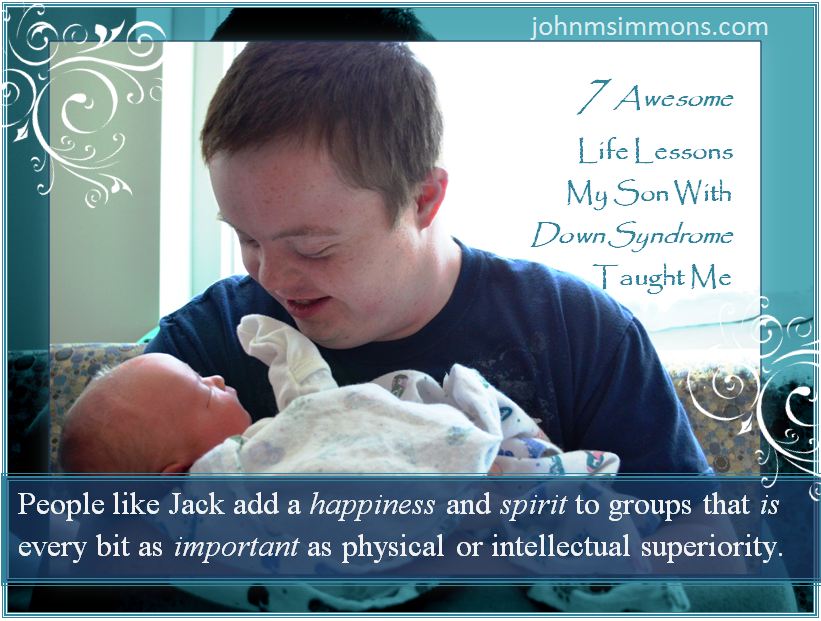Seven Awesome Life Lessons my son With Down Syndrome Taught me
As Seen in Huffington Post
Amy and I had three biological sons when we adopted a one-month-old little boy with Down syndrome and started taking lessons from him. Jack was fragile. He would require open heart surgery by the time he was six months old.
Jack contracted post-operative pneumonia and it was looking like he might become a part of the fifteen percent of children at that time, who didn’t make it home after surgeries like his. I still remember his older brothers, aged six to two, standing around that enormous hospital bed looking longingly at a tiny sibling with more wires and tubes than they could count going from his body to the intimidating flashing, beeping and humming medical equipment. Any of us would have done anything to make him well, but there was nothing we could do. As I recalled our five months together, I realized that there were no regrets. That was the first lesson Jack taught me. When death causes a separation between me and anyone I love, I want to have that same feeling. I want to have nothing amiss. If anything has been out of order, I want to have repaired it to the best of my ability.
The next time my son took me to school, he wasn’t even in school, yet. Jack didn’t walk until he was three. He potty trained when he was four. My son didn’t progress quickly, but he did progress. If I tried to measure him against his siblings and the rate that they learned, there could only be disappointment. But when we celebrated Jack’s accomplishments for what they were to him, and measured them against his own challenges, advancement for him was at least as impressive as it was for any of our other children. I had no idea how important this lesson was until we adopted several more children and eventually learned that some of them suffered from attachment disorders. Jack 101 taught me to allow my children with attachment difficulties the time that they needed to progress. That course also gave me the understanding, that for these children, accomplishments which might have seemed slight to others, could be celebrated by my family as the monuments they truly were.
People like Jack add a happiness and spirit to groups that is every bit as important as physical or intellectual superiority.
The third lesson I learned from Jack happened over time. I guess it was apparent early on, but the more time I spent with him, the more I came to understand how little intellectual prowess means when it comes to how much someone can add to a family, or for that matter, to any other group of people. Jack was often among first players picked for teams, and many times, the opposition would counter by choosing someone with similar challenges. There is no doubt that such actions were acts of friendship and compassion, but there is more to it than that. People like Jack add a happiness and spirit to groups that is every bit as important as physical or intellectual superiority.
It’s counter intuitive to believe that words like favorite and best can be used for a plethora of similar things. That’s the fourth life lesson Jack taught me, though. About half of the meals my wife fixes are Jack’s favorite, as are dozens and dozens of songs. He has many “favorite” football teams and “favorite” movies. In the beginning, I thought Jack’s over-use of words like best and favorite were just a lack of language understanding. It turns out it is I who have a comprehension deficit. Jack is simply saying that these things bring him a maximum amount of happiness and joy. Life would be better for all of us if we could find so much fulfilment and satisfaction from so many competing people and things.
Jack has never noticed skin color, clothing condition, cleanliness and hygiene, or physical/mental handicaps as identifiers.
Jack is happy with Jack. Sometimes he gets discouraged about not being able to have a driver’s license, or when a sweet girl, an awesome friend, chooses someone else for a boyfriend. But Jack takes it in stride. The fifth life lesson I learned from him was acceptance. One day, when he seemed particularly clear of thought, he asked his mother what was wrong with him. Her explanation of his condition and clarification that nothing was “wrong” was brilliant. Jack’s acceptance of a condition he wasn’t pleased with, but couldn’t change, was life-changing for me. And to watch him move forward, unhindered, to be the best he could be at what he was best at doing, would be an inspiration to anyone.
The sixth life lesson Jack taught me was about unconditional love. My son is quick to forgive. Even the meanest of taunts or bully behavior are forgotten with a simple apology. Such an offender is immediately re-classified as one of his “best” friends. Jack would give you the shirt off his back, or someone else’s back, for that matter. (Hey, if you need it, you need it.) Jack has never noticed skin color, clothing condition, cleanliness and hygiene, or physical/mental handicaps as identifiers. He loves people as much as he can love them no matter what they can or can’t do for him and no matter what they look like. I have learned by watching Jack that when you love people unconditionally, they love you back.
Recently, I walked into the house and Jack asked me how my day was. When I responded that it was horrible, my son simply shrugged and said: “Oh well. Try again tomorrow, huh, Dad?” That number seven is my favorite life lesson I learned from that son. No matter how bad my day is, I can always try again tomorrow.
More blog articles by John M. Simmons about Down Syndrome/Intellectual Disabilities.
Back to John M. Simmons’ blog

